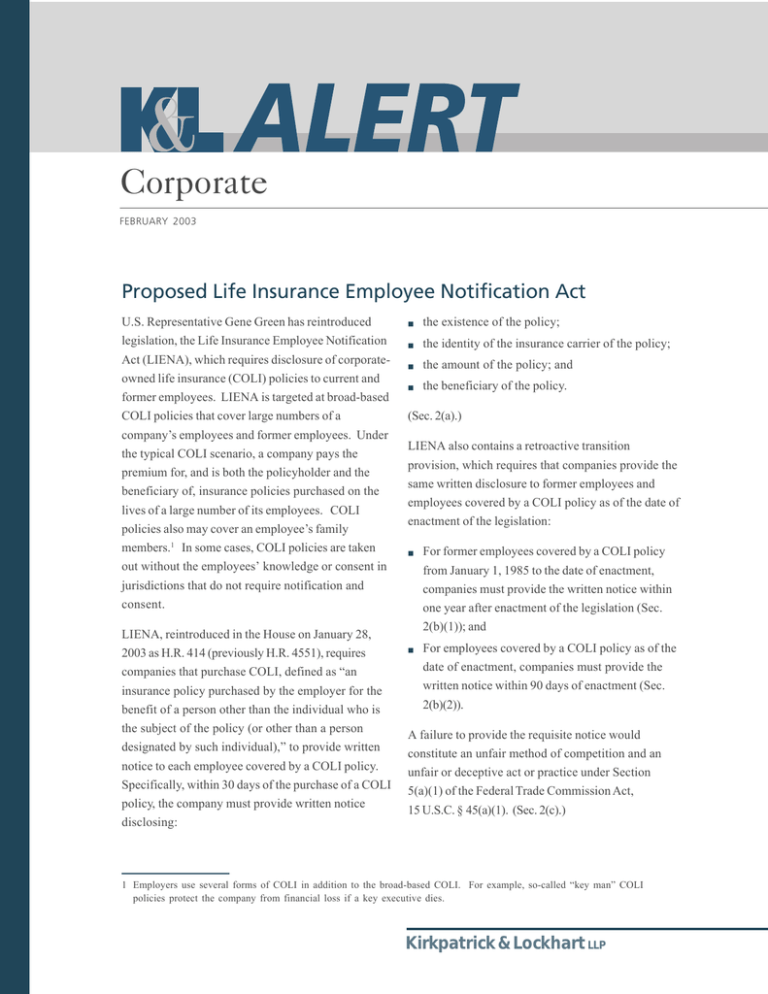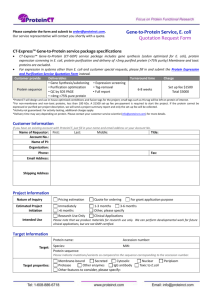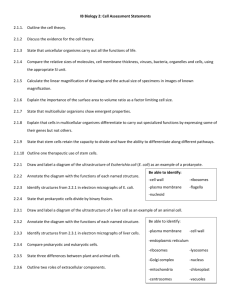
Corporate
FEBRUARY 2003
Proposed Life Insurance Employee Notification Act
U.S. Representative Gene Green has reintroduced
legislation, the Life Insurance Employee Notification
Act (LIENA), which requires disclosure of corporateowned life insurance (COLI) policies to current and
former employees. LIENA is targeted at broad-based
COLI policies that cover large numbers of a
company’s employees and former employees. Under
the typical COLI scenario, a company pays the
premium for, and is both the policyholder and the
beneficiary of, insurance policies purchased on the
lives of a large number of its employees. COLI
policies also may cover an employee’s family
members.1 In some cases, COLI policies are taken
out without the employees’ knowledge or consent in
jurisdictions that do not require notification and
consent.
LIENA, reintroduced in the House on January 28,
2003 as H.R. 414 (previously H.R. 4551), requires
companies that purchase COLI, defined as “an
insurance policy purchased by the employer for the
benefit of a person other than the individual who is
the subject of the policy (or other than a person
designated by such individual),” to provide written
notice to each employee covered by a COLI policy.
Specifically, within 30 days of the purchase of a COLI
policy, the company must provide written notice
disclosing:
■
the existence of the policy;
■
the identity of the insurance carrier of the policy;
■
the amount of the policy; and
■
the beneficiary of the policy.
(Sec. 2(a).)
LIENA also contains a retroactive transition
provision, which requires that companies provide the
same written disclosure to former employees and
employees covered by a COLI policy as of the date of
enactment of the legislation:
■
■
For former employees covered by a COLI policy
from January 1, 1985 to the date of enactment,
companies must provide the written notice within
one year after enactment of the legislation (Sec.
2(b)(1)); and
For employees covered by a COLI policy as of the
date of enactment, companies must provide the
written notice within 90 days of enactment (Sec.
2(b)(2)).
A failure to provide the requisite notice would
constitute an unfair method of competition and an
unfair or deceptive act or practice under Section
5(a)(1) of the Federal Trade Commission Act,
15 U.S.C. § 45(a)(1). (Sec. 2(c).)
1 Employers use several forms of COLI in addition to the broad-based COLI. For example, so-called “key man” COLI
policies protect the company from financial loss if a key executive dies.
Kirkpatrick & Lockhart LLP
It is reported that, when previously introduced as
H.R. 4551, LIENA had 51 co-sponsors.
LIENA presents an example of the recent controversy
surrounding the sale of leveraged COLI policies,
which have been a popular funding mechanism for
many Fortune 500 companies since the late 1980s.
The sale of leveraged COLI policies largely ceased
after Congress passed the Health Insurance
Portability and Accountability Act of 1996 (HIPAA),
which gradually phased out the corporate employer’s
ability to deduct interest on COLI policy loans.
NEAL R. BRENDEL
nbrendel@kl.com
412.355.6550
ROBERTA D. ANDERSON
randerson@kl.com
412.355.6222
FOR ADDITIONAL INFORMATION concerning this topic or any Corporate issue,
please consult one of the K&L office contacts listed below:
Boston
Stephen L. Palmer
617.951.9211
spalmer@kl.com
Dallas
Norman R. Miller
214.939.4906
nmiller@kl.com
Harrisburg
Carleton O. Strouss
717.231.4503
cstrouss@kl.com
Los Angeles
Mark A. Klein
310.552.5033
mklein@kl.com
Miami
Clayton E. Parker
305.539.3306
cparker@kl.com
Newark
Stephen A. Timoni
973.848.4020
stimoni@kl.com
New York
John D. Vaughan
212.536.4006
jvaughan@kl.com
Pittsburgh
Janice C. Hartman
412.355.6444
jhartman@kl.com
San Francisco
Mark H. Davis
415.249.1020
mdavis@kl.com
Washington
Thomas F. Cooney, III
202.778.9076
tcooney@kl.com
®
Kirkpatrick & Lockhart LLP
Challenge us. ®
www.kl.com
BOSTON
■
DALLAS
■
HARRISBURG
■
LOS ANGELES
■
MIAMI
■
NEWARK
■
NEW YORK
■
PITTSBURGH
■
SAN FRANCISCO
■
WASHINGTON
.........................................................................................................................................................
This publication/newsletter is for informational purposes and does not contain or convey legal advice. The information herein
should not be used or relied upon in regard to any particular facts or circumstances without first consulting a lawyer.
© 2003 KIRKPATRICK & LOCKHART LLP.
ALL RIGHTS RESERVED.









